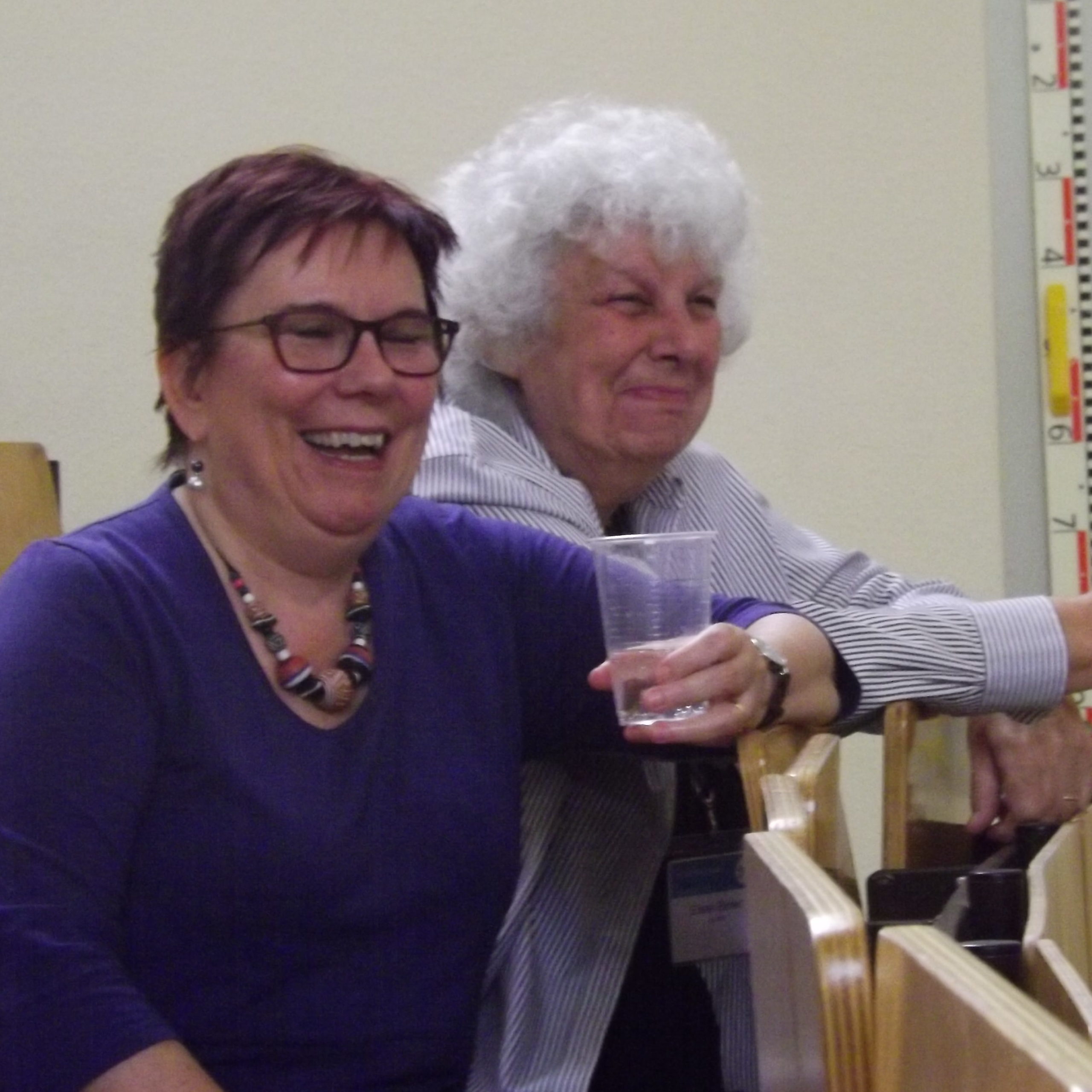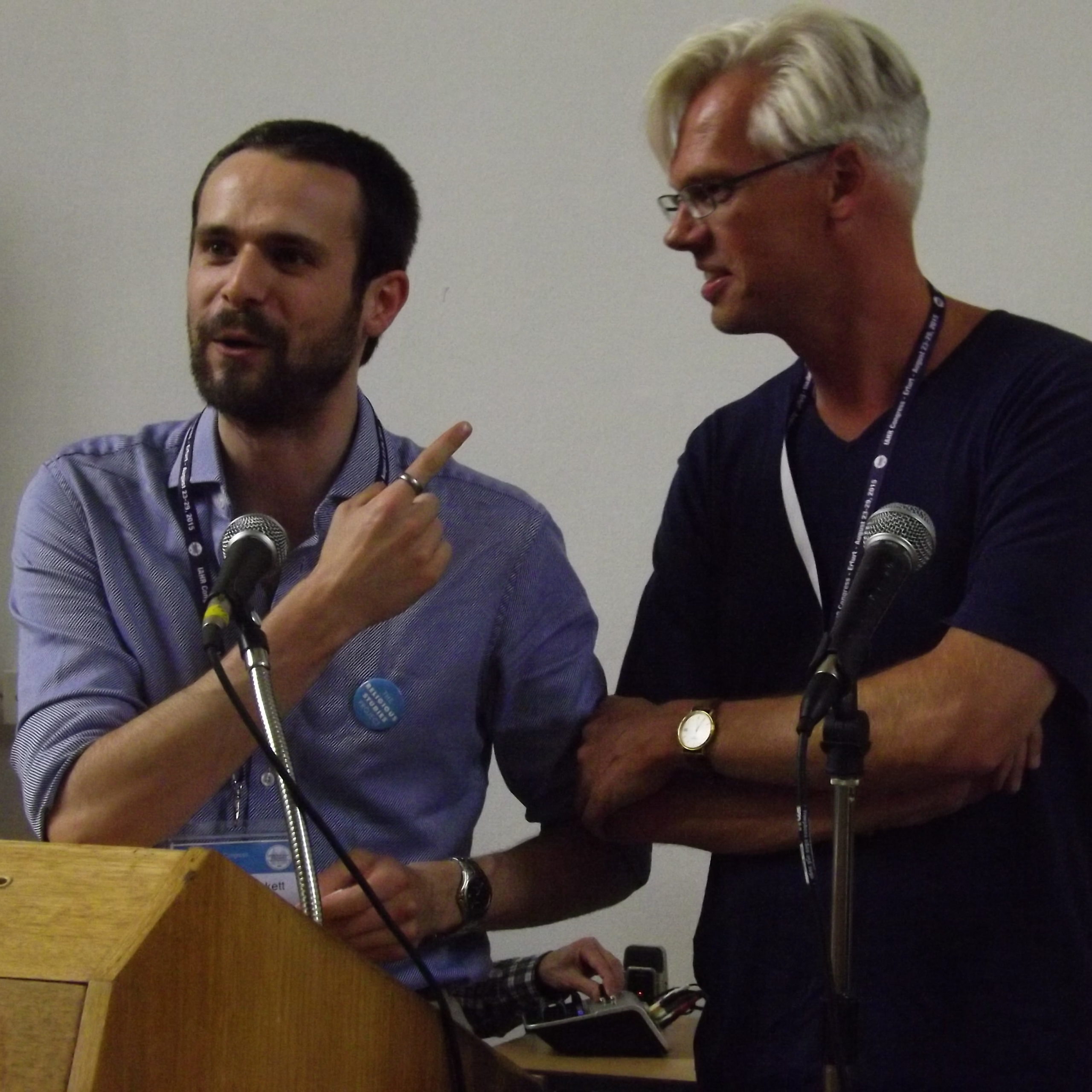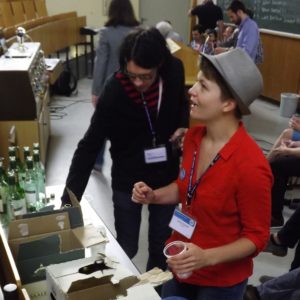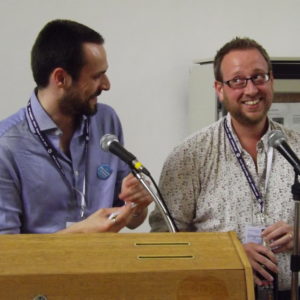Minority Religions and the Law
Surely we have moved past the idea of sinister cults brainwashing innocent victims? When it comes to the law, not so, says Susan J. Palmer, which uses the terms "cult" and "sect" uncritically. Nevertheless, outside of academia, the language of "cults" continues to be used, and particularly through the law, has an affect on the lives of real people.
In this episode, Susan J. Palmer, co-editor of Storming Zion: Government Raids on Religious Communities, joins David G. Robertson to discuss the intersection between new or minority religions and the law. Professor Palmer describes how she came to study these minority groups, and to realise that they were often being misrepresented, or at least unduly targeted. Discussion ranges from Scientology in France to the Branch Davidians and the Nuwaubians in the US, with issues of secularity, race and "brainwashing" come to the fore. A fascinating overview for anyone interested in how the discourse on "religion" operates in the contemporary world.
Fourteen to One! | Mid-Year Special 2015
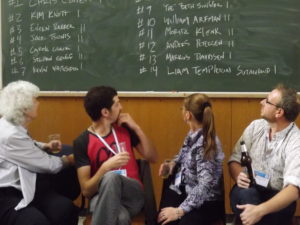
Fourteen contestants. One tetchy quizmaster. Three microphones. Numerous cases of wine. One glamorous assistant. Many bruised egos. A boisterous studio audience. A splash of irreverence. Dozens of questions. Four years of podcasts! A rapidly diminishing reservoir of academic credibility. And far, far too many in-jokes... it can only mean one thing, right? It's time for the Religious Studies Project Special 2015!
Back in August. as many of you will be aware, the RSP had the pleasure of being well-represented at the XXI World Congress of the International Association for the History of Religions at the University of Erfurt, Germany. Having previously recorded fun-filled festive specials at BASR and EASR conferences, we decided that it would be a crying shame if we didn't manage to continue to collect the full set... and thus was born the audio delight that we present to you now, in celebration of the end of our fourth year "on the air."
This year we welcome back Jonathan Tuckett as host, with score-keeping assistance from Ethan Quillen, technical wizardry from David Robertson and atmospheric jeers and cheers from our studio audience, to bring you Religious Studies Fourteen-to-One. in this academic royal rumble, fourteen contestants enter, but only one can emerge victorious. Can Carole Cusack keep the coveted RSP Special crown? Listen to find out!
In order of appearance, our fourteen unlucky victims contestants are:
- Christopher Cotter
- Kim Knott
- Eileen Barker
- Jack Tsonis
- Carole Cusack
- Stephen Gregg
- Kevin Whitesides
- Teemu Taira
- Beth Singler
- William Arfman
- Moritz Klenk
- Anders Petersen
- Markus Davidsen
- Liam Sutherland
Listeners may also be interested in our previous mid-year specials — Only 60 Seconds, Nul Point, and MasterBrain — as well the serious interviews we recorded in Erfurt, with Whitney Bauman, Tomoko Masuzawa, Susan J. Palmer, S. Brent Plate, Johannes Quack, and Kocku von Stuckrad.
General, inoffensive and non-specific greetings to all our listeners, and best wishes for 2016! We are, of course, well aware that the RSP year is dictated to a large part by the hegemonic cultural norms in Scotland, and in 'the West' more broadly... we hope that you can forgive any uncritical uses of the "C-word" in this podcast! (No, not that one...)
We’ll be back in January for year five — even bigger and better than ever. Many thanks to everyone who took part in this recording — the contestants, the hosts, Anja Pogacnik for awesome photography and the studio audience. Thanks to the IAHR team in Erfurt for facilitating this recording at incredibly short notice. And, finally, and perhaps most importantly, thanks for listening.
Teaching and Learning in Contemporary Religious Studies
As we career forward into the twenty-first century, in a context where more and more students have access to higher education, where technology advances at an exponential rate, and where the logics of neoliberalism and management seemingly creep further into every aspect of everyday life, critical reflection about the role of academics in teaching has never been more necessary. In this our first podcast of 2016, Chris was joined by Dr Dominic Corrywright of Oxford Brookes University in the UK, to discuss current developments in higher education pedagogy, the challenges and opportunities that these present for Religious Studies, and some practical examples from Dominic’s own experience.
Dominic Corrywright is Principal Lecturer for Quality Assurance, Enhancement and Validations, and Course Coordinator for Religion and Theology at Oxford Brookes. Alongside other research interests, including alternative spiritualities and new religious movements, Dominic has a strong research focus on teaching and learning in higher education, and pedagogy in the study of religions. He is Teaching & Learning representative on the executive committees of both the Particularly relevant publications include a co-edited issue of the BASR’s journal DIskus on Teaching and Learning in 2013, including his own article Landscape of Learning and Teaching in Religion and Theology: Perspectives and Mechanisms for Complex Learning, Programme Health and Pedagogical Well-being, and a chapter entitled Complex Learning and the World Religions Paradigm: Teaching Religion in a Shifting Subject Landscape, in a certain forthcoming volume edited by the RSP's Christopher Cotter and David Robertson.
Listeners might also be interested in our previous interview with Doe Daughtrey on Teaching Religious Studies Online. You can download this interview, and subscribe to receive our weekly podcast, on iTunes. If you enjoyed it, please take a moment to rate us . And remember, you can use our Amazon.co.uk, Amazon.com, or Amazon.ca links to support us at no additional cost when buying academic texts, ink cartridges, My Little Ponies, and more!
Getting to Know the North American Association for the Study of Religion
In this interview, Russell McCutcheon and Aaron Hughes discuss the North American Association for the Study of Religion (NAASR), an international organization dedicated to historical, critical, and social scientific approaches to the study of religion. McCutcheon and Hughes (the president and vice president of NAASR, respectively) discuss the history of NAASR, their attempt to help return NAASR to its original mission, various publications associated with NAASR, and the philosophy or motivations that guided their annual conference this year.
In January 2016, we welcomed the North American Association for the Study of Religion (NAASR) as an additional sponsor. We are indebted to NAASR for their generosity, and we look forward to working with them in the years to come to continue what we do, and to bring about some important and long-planned innovations.
The North American Association for the Study of Religion (NAASR) was initially formed in 1985 by E. Thomas Lawson, Luther H. Martin, and Donald Wiebe, to encourage the historical, comparative, structural, theoretical, and cognitive approaches to the study of religion among North American scholars; to represent North American scholars of religion at the international level; and to sustain communication between North American scholars and their international colleagues engaged in the study of religion.

You can download this interview, and subscribe to receive our weekly podcast, on iTunes. If you enjoyed it, please take a moment to rate us . And remember, you can use our Amazon.co.uk, Amazon.com, or Amazon.ca links to support us at no additional cost when buying academic texts, incense, driving gloves, and more.
See you in the next life? Cognitive foundations of reincarnation beliefs
Human reincarnation: Same person, different body, another life. From established theological doctrines to local folk beliefs, the idea that deceased individuals may be “reborn” into the body of another can be found all over the world (White, In press). Since the writings of philosopher John Locke in the 17th century, establishing personal identity has primarily focused on memory. The interplay between memories and what constitutes a person’s identity plays an interesting role in reincarnation beliefs. For example, when juxtaposed alongside theologies that teach that the individual undergoes mental or physical changes in the process of rebirth, how can this same individual be identified in the new life if they have undergone changes (White, 2015)? In this podcast, Dr. Claire White brings the tools of cognitive science of religion (CSR) to bear on this question and several others surrounding reincarnation beliefs.
Dr. White begins by discussing the ongoing research at her laboratory at California State University, Northridge. She goes on to introduce the topic of reincarnation, noting that only recently has CSR paid much attention to these types of beliefs. While conceptual scaffolding surrounding the idea of reincarnation can vary widely from culture to culture, Dr. White draws on some of her recent research pointing out that many similarities exist in how individuals reason about and discern the pre-rebirth identities of the reincarnated. In closing, Dr. White shares some preliminary insights gathered from her ethnography of “past-life groups” in the western United States. Interested in why some individuals may be attracted to these groups, she suggests the groups may function as a form of psychotherapy and self-actualization for those attending.
Listeners may also be interested in our previous podcasts on Religion and Memory, and Cognitive Approaches to the Study of Religion. You can download this interview, and subscribe to receive our weekly podcast, on iTunes. If you enjoyed it, please take a moment to rate us . And remember, you can use our Amazon.co.uk, Amazon.com, or Amazon.ca links to support us at no additional cost when buying academic texts, small dinosaur figurines, poppy seeds, and more.
Many thanks to NAASR for facilitating the recording of this interview.
References
- White, C. (2015). Establishing Personal Identity in Reincarnation: Minds and Bodies Reconsidered. Journal Of Cognition And Culture, 15(3-4), 402-429. http://dx.doi.org/10.1163/15685373-12342158
- White, C. (In press). The Cognitive Foundations of Reincarnation. Method and Theory in the Study of Religion.
Religion and American Law
In this interview, Professor Eric Mazur discusses a variety of issues relating to religion and law in the USA, such as the evolving state of First Amendment jurisprudence, the Religious Freedom Restoration Act, dominant trends in the study of religion and American law, and controversial legislation such as the Supreme Court's decision in Burwell v. Hobby Lobby. Dr. Mazur also discusses his efforts to help cultivate a space at the American Academy of Religion that is explicitly devoted to the study of religion and American law. This interview provides an introduction and summary of this increasingly important field.
Minority Religions and the Law, and our general introduction to Religion and the Law with Winnifred F. Sullivan. You can download this interview, and subscribe to receive our weekly podcast, on iTunes. If you enjoyed it, please take a moment to rate us . And remember, you can use our Amazon.co.uk, Amazon.com, or Amazon.ca links to support us at no additional cost when buying academic texts, potpourri, vintage cars, and more.
Video Games and Religious Studies
The project of legitimating new cultural commodities into the canon of interpretative objects can be lengthy process. In this interview with University of North Carolina at Greensboro Associate Professor Greg Grieve, video games are presented as a content moving from the margins to the center of the intersection of religion and popular culture. Grieve explains how he integrates play and critical analysis into his course, and narrates the process by which his university's library created a space to support his innovative classroom work.
invented religions, allow users to create and experience virtual religious spaces, and much more. Students often come to video games in need to critical tools to move beyond play to critical thinking with/about games, but Grieve's laboratory methods create miniature experimental situations for students to assess gaming content alongside the gaming experience. Like many other technical tools, games in the classroom require not just some elements of hardware but also new techniques, methods, and theoretical models. This is challenging, yes, but in Greive's opinion the hurdles are well-worth the results: invested students, powerful classroom experiences, and content that is as diverse and rich as any other popular culture materials.
This interview was recorded at the 2015 AAR Conference in Atlanta, Georgia.
**We are aware that the audio quality this week is not up to our usual standards, but we hope that the content of the interview more than makes up for this. Apologies.**
Listeners may also be interested in our previous podcasts on Invented Religions, Religion and Film, Religion and Literature, Visual Culture and the Study of Religion, Religion and Comic Books, and Religion and Cultural Production. You might also be interested in the article Locating the Locus of Study on "Religion" in Video Games, written by our own Jonathan Tuckett and David Robertson. You can download this interview, and subscribe to receive our weekly podcast, on iTunes. If you enjoyed it, please take a moment to rate us . And remember, you can use our Amazon.co.uk, Amazon.com, or Amazon.ca links to support us at no additional cost when buying academic texts, video games, indulgences, and more.
Method and Theory in the Cognitive Sciences of Religion
podcast with the Religious Studies Project in 2014, Dr. Robert McCauley gave an overview of some of these processes cognitive scientists appeal to in accounting for religion (e.g., agent detection, theory of mind), as well as a 2015 North American Association for the Study of Religion (NAASR) conference (and thanks to their support), McCauley discusses methodological and theoretical issues within CSR. He begins by tackling the topic of “naturalism” vs. “supernaturalism” in explaining religion, moving on to how these explanations function at different levels of analysis and integration. In closing, McCauley discusses the relationship between the humanities and the sciences, some successful and not so successful CSR theories, and the interplay between explanations emphasizing cognition and culture.
You can download this interview, and subscribe to receive our weekly podcast, on iTunes. If you enjoyed it, please take a moment to rate us . And remember, you can use our Amazon.co.uk, Amazon.com, or Amazon.ca links to support us at no additional cost when buying academic texts, video games, indulgences, and more.
Religious Studies as a Discipline
Aaron Hughes (University of Rochester) has been a vocal critic of some of the theories and methods used by religious studies scholars working on Islam. In this podcast, he discusses his critique of the discipline and practice of religious studies he has made through works such as Situating Islam (Equinox, 2008), Theorizing Islam (Equinox, 2012), Abrahamic Religions (Oxford, 2012), The Study of Judaism (SUNY, 2013), and, most recently, Islam and the Tyranny of Authenticity (Equinox, 2015).
This sustained focus on the field of religious studies is not only a concern with identity--the political boundaries of the field as established by its scholars and 
Listeners might also be interested in our previous podcasts on Religion as Sui Generis, The Relationship between Theology and Religious Studies, Teaching and Learning in Contemporary Religious Studies, The Critical Study of Religion, and Biblical Studies and Religious Studies. You can download this interview, and subscribe to receive our weekly podcast, on iTunes. If you enjoyed it, please take a moment to rate us . And remember, you can use our Amazon.co.uk, Amazon.com, or Amazon.ca links to support us at no additional cost when buying academic texts, storage boxes, tiny shoes and more.
Popular Culture Studies and Bruce Springsteen: Escaping and Embracing Religion
Kate McCarthy in 2013, shortly after the re-release of her co-edited volume God in the Details. However, listening back to this unreleased (until now!) interview, her commentary both on the metamorphic nature of popular culture studies and on the music of Bruce Springsteen remain salient and fresh even today. With "the Boss" having just finished his tour in support of the re-released The River and a new solo album planned, it seemed fitting to unearth this interview between McCarthy and A. David Lewis, tracking Springsteen's relationships to the Church and to women.
This interview was recorded by A. David Lewis - who has been an interviewee on the RSP twice in the past - for a separate project. As fate would have it, the interview has made its way into our hands and we are delighted to bring it to you now.
Video Games and Religious Studies, Religion and Film, Religion and Literature,Visual Culture and the Study of Religion, Religion and Comic Books, and Religion and Cultural Production. You can download this interview, and subscribe to receive our weekly podcast, on iTunes. If you enjoyed it, please take a moment to rate us . And remember, you can use our Amazon.co.uk, Amazon.com, or Amazon.ca links to support us at no additional cost when buying academic texts, ornaments, puncture repair kits, and more.

